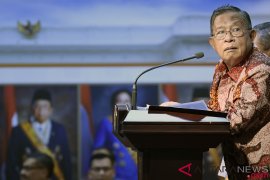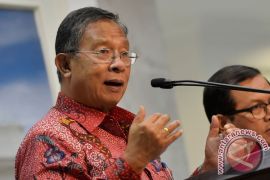"Admittedly, it (the economic policy package) will not instantly make it (the economy) good," Kalla said at the Vice Presidential Office here on Tuesday.
The package consists of several steps, including those aimed at enhancing efficiency, he said.
Chief of the Presidential Staff Teten Masduki said the package is part of a series of economic policy packages the government will issue in response to the market needs.
"The new policy package only involves deregulation of the trade and industrial sectors," he said.
In the short run, the government is looking forward to strengthening the purchasing power of the public, increasing investment, stabilizing prices and boosting exports, he said.
The purchasing power of the people will rise if domestic economic activities increase and more jobs are created, he said.
It is unlikely that the economic policy package, in the short-term, will lead to an immediate strengthening of the rupiahs exchange rate against the dollar, unless there is a huge foreign capital inflow in the domestic market or a surge in exports, he said.
The government is in the process of improving the investment climate. Besides, the global demand for commodities is also low, he said.
On Wednesday (Sept 9), the government announced the first phase of its economic policy package.
President Joko Widodo said the economic policy package will strengthen the national industry and will help develop small and medium enterprises.
"The stimulus package is expected to facilitate inter-regional trade and tourism, as well as improve the lot of fishermen and boost fish catch. The package will also economize fuel consumption by 70 percent through the conversion of diesel into liquefied petroleum gas (LPG)," the President said while announcing the package.
He enumerated the three measures contained in the economic policy package.
Firstly, the government would encourage national and industrial competitiveness through investment deregulation, law enforcement and business assurance.
Secondly, the government would accelerate the national strategic project by removing obstacles in the implementation and completion of projects.
Thirdly, the government planned to increase investment in the property sector.
"A total of 89 regulations have been revised as part of the efforts to make procedures more coherent, prune irrelevant regulations and increase the competitiveness of the national industry," the President reiterated.(*)
Editor: Heru Purwanto
Copyright © ANTARA 2015



